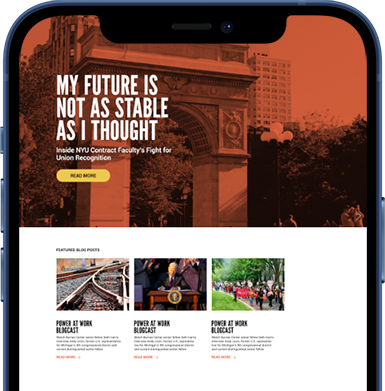Photo by U.S. Department of Agriculture, CC BY 2.0
If there ever was a titan of the labor movement, it was Leo Gerard.
As President of the United Steelworkers Union (USW) from 2001 until his retirement in 2019, Leo enhanced worker power, saved the steel industry, broadened public support for manufacturing’s resurgence, and improved the lives of millions of workers. But he also fought for a clean environment, health care for all, justice, equity and so much more.
I have been honored to work with the Steelworkers for almost 50 years, first on Capitol Hill and later as counsel to the union’s president. I have been lucky to have known their leaders from Lloyd McBride to Lynn Williams to George Becker to Leo Gerard, as well as Tom Conway and current president Dave McCall.
As the largest industrial union in North America, leading USW is no easy task. Many people do not know that the union represents workers not only in steel and other metals, but in paper, mining, glass, rubber and in healthcare, education, government and a variety of other sectors. The rising tide of globalization has put many of these sectors at risk, but USW has never shied away from a fight.
I have learned a great deal from the various USW presidents, leaders, staff and members. But Leo Gerard had a special place in my heart. We worked together for more than 18 years. He was not only a client, but also a mentor and a dear friend. Leo’s commitment made it easier to get up every day and go to work because I knew that, despite the ups and downs, the fights were worth fighting.
I first met Leo when he was the USW’s Secretary Treasurer. George Becker, then the union’s president, worked hard to ensure an orderly transition to Leo’s presidency. George and Leo would spend many weekend mornings going to the flea market together, sharing breakfast and talking about the union, life, family and politics. George placed his confidence in Leo and brought me into that confidence. George saw Leo as an able union leader, bargainer and fighter, but also as a visionary. George’s belief in Leo was well-placed.
Leo was as authentic as they came. At his core, he was that tough-minded union worker through and through. He never forgot where he came from. He came directly from the floor of the nickel smelter where he wielded a sledgehammer. In Washington, Leo also wielded a sledgehammer, but it was made from righteousness, idealism and commitment.
Leo’s word was his bond. He said what he meant and meant what he said. He spoke up and spoke out never ceding an inch. It is not that he refused to compromise: for example, Leo was reluctant to take his members out on strike knowing the cost that a strike could impose on them and their families. But he also wouldn’t back down from a fight.
One former government official e-mailed me this past week offering his condolences and his reflections: “Leo was funny, he was a character, he could be angry about positions that did not live up to his standards – he was plain spoken, but his anger or frustration was genuine, never mean, never personal. He was warm-hearted. He was an honorable man. Above all, he always sought to represent his workers well. And he did.”

Photo by United Steelworkers, CC BY-SA 2.0
Leo’s primary focus, of course, was on the members. He saw them not only as workers, but also as family members, community leaders, sportsmen and sportswomen, and so much more. He was tireless in his efforts and rarely said “no” to an invitation to speak, to help, to make a difference.
People often see manufacturing as a dirty sector with pictures of smokestacks belching pollution on the horizon. But like his predecessors, Leo recognized the shared commitment his members and the USW had to the environment. USW was the first union to support the Clean Air Act when it was proposed, but Leo made the union’s leadership on environmental issues operational daily. He forged a partnership with the Sierra Club in the form of the Blue Green Alliance, which has expanded and continues to have an impact to this day.
Leo helped form the Alliance for American Manufacturing, a partnership between the union and some of their largest employers, with the goal of strengthening American manufacturing. His leadership helped to ensure that the fight to retain steelmaking in the US would continue. The organization’s work has extended further by highlighting the critical connection between economic and national security.
Leo worked to forge partnerships with labor leaders and workers across the globe. He fought and led, many of the battles against unfair trade and misguided trade agreements. He was a formidable foe.
Leo was a hero, and a legend. He was my friend.
To Leo’s family, friends, and colleagues, he will be dearly missed.
To all the workers out there, union and non-union, whether they know it or not, his impact will be felt for generations. On their behalf, I once again say “thank you.”
Thank you for changing their lives – thank you for changing mine.
Leo had a mantra he would often say: “Dream big dreams. Fight big fights.”
In your memory, Leo, we keep dreaming. We keep fighting.
In solidarity.

